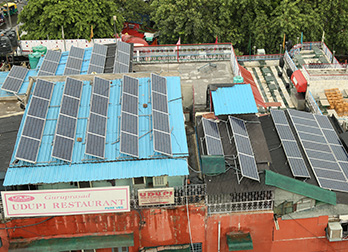A Solar Step Ahead
Aditi Sinha, November 28, 2018
The rooftop solar sector in India is gradually gaining momentum. More and more home owners as well as businesses are expressing an interest in adopting rooftop solar systems. We spoke to Mr. Akash Rao, Proprietor of the popular Guruprasad Udupi restaurant in New Delhi, who for the last two years, has been using a solar rooftop system to meet the restaurant’s power needs. Read what Mr. Akash has to say about Udupi’s successful rooftop solar system. Understand why he encourages people to shift to cleaner and efficient sources of energy and how the rooftop solar system has helped the restaurant in reducing grid electricity requirements during daytime.
Q) Why did you decide to install a rooftop solar system?
A) The restaurant has a great location. Ample amount of sunshine is received throughout the day. The deciding factor, however, was the open sky. If the restaurant was on the ground floor, then it would have been a challenge to install the solar panels. We also wanted to reduce electricity costs, and rooftop solar was the best option.
Q) What was the cost of setting up the rooftop solar system?
A) We procured the solar panels at a very competitive price, around Rs. 60,000 per kilowatt (kW).
Q) What is the capacity of your rooftop solar system and does it meet your electricity needs?
A) The sanctioned load is 49 kW and the rooftop solar system is 20 kW. All the generated units are being used entirely and there has not been much surplus to feed back to the grid.
Q) Tell us about how much electricity is saved?
A) In two years, the solar panels helped reduce the monthly electricity costs of the restaurant by almost 15%. Our establishment is old hence the internal wiring is also old. Our solar panels would be more efficient if the wiring would be newer.
Q) What is your experience with the net-metering model?
A) We installed a net metering system to feed electricity that is not used back into the grid. While we generate a little surplus in summers sometimes but mostly our generated power is consumed completely.
Q) What is one of the key challenges faced during the process of transitioning to a rooftop solar system?
A) We faced some documentation errors with BSES while transitioning to net-metering. As a result of this, our electricity bills were on the higher side for a few months. It is important to align the documentation and setting up of net metering. If you install solar panels with the old meter, our (bill) costs will go up in two months.
Q) How frequently do you maintain and service the panels?
A) Regular maintenance is necessary for the panels. We have staff that does the cleaning every week or two. For the past two years, we have faced no glitches in the functioning of our rooftop solar grid. When weather conditions are bad, the main grid helps supply electricity. We do not completely rely on the solar system.
Q) How do we get more people to install rooftop solar? What advice would you give to other commercial establishments who want to adopt it but do not know how to go about it?
A) Consumers should be encouraged to look at solar rooftops as a cleaner and viable source of energy. Companies should advertise and market themselves to reach out to the masses. Some monetary incentives can be offered and packaged with already existing facilities available at institutions like banks, post offices etc. If people have the space, then solar rooftops is a great option. Installation should be easy, and the equipment should be movable and packable, as per one’s convenience.
Q) How has your overall experience of installing the rooftop solar system been?
A) The overall experience has been positive. Our interactions with the discom (BSES) have been positive.
(The views expressed in this interview are personal and do not necessarily reflect those of Shakti Sustainable Energy Foundation)
